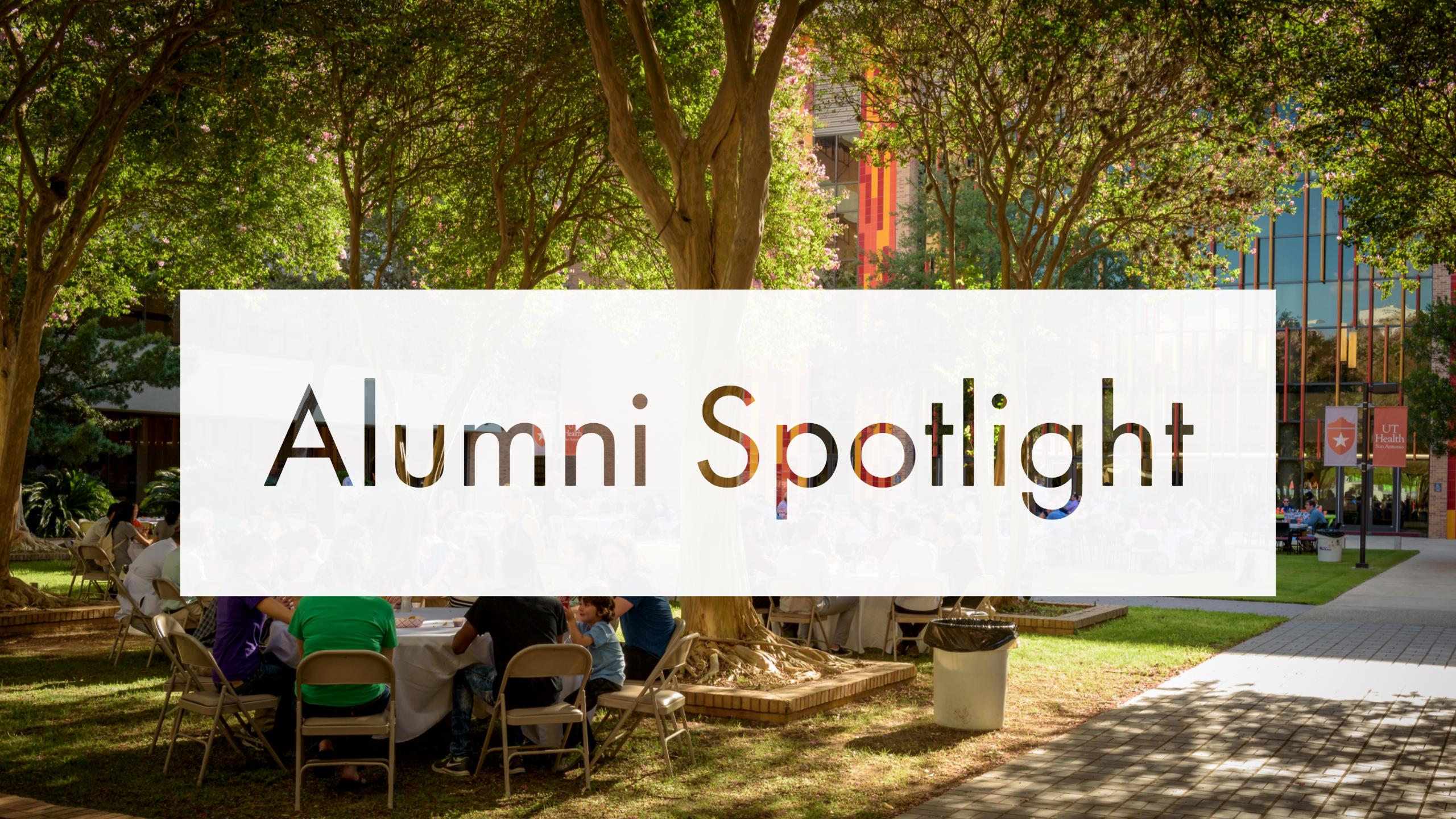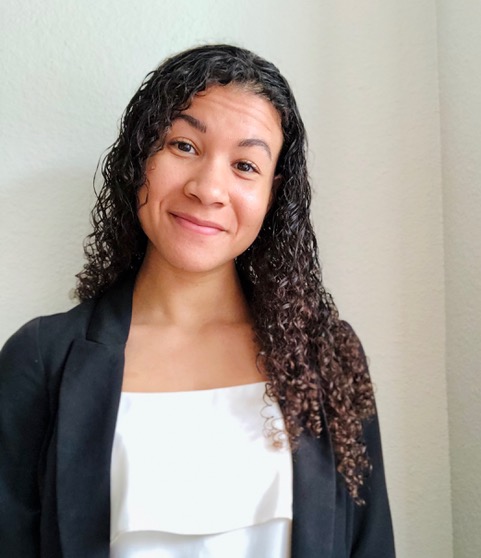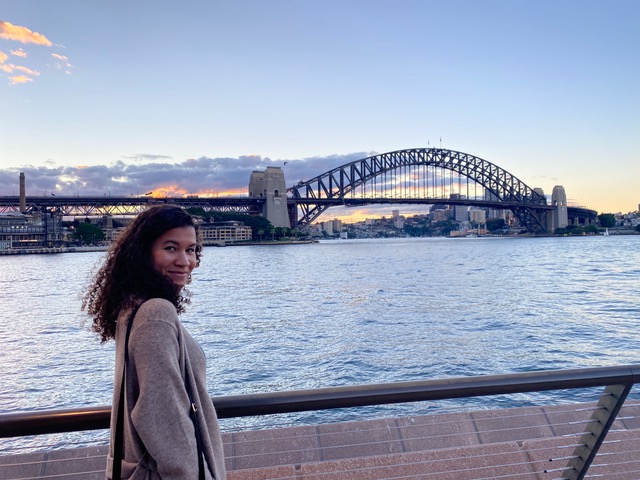Morgan Bucknor: My New Life in Australia

Morgan Bucknor graduated in 2020 from the M.S. in Cell Systems and Anatomy with a focus in the Biotechnology track. She is currently a Ph.D. student in the Life and Environmental Sciences program at The University of Sydney, Australia.
 1) When did you first become interested in science?
1) When did you first become interested in science?
Growing up in the foreign service required my family and I to pick up and move overseas every couple years. We were posted at U.S. Embassies in Southeast Asia, Africa, and Europe. During my time in the beginning of middle school, we were living in India, and I believe that’s when I really took an interest in biology. It was my first introduction to a new region of the world that really made an impact on me, and I remember being so fascinated by all the different hallmarks of that environment; from the exotic animals that would make the occasional appearance in our backyard, to the raging monsoon seasons. I was always keen for my science classes in every part of the world we went and enjoyed being able to understand how the world worked around me not just in the classroom, but with every new destination as well.
2) Why did you pick The University of Texas Health Science Center at San Antonio and your program?
I came to UT Health San Antonio for my Master of Science degree and was initially interested in pursuing Biology of Aging research. I did a thorough search for programs that had any faculty doing aging research or affiliations with the National Institutes of Aging and came across The Barshop Institute within UT Health San Antonio! After a bit more digging, I found the Cell Systems and Anatomy MS program and was very interested in working with several faculty in the Biotechnology track who specialized in a variety of areas in human biology. I found it to be a very attractive program for me because it really allowed me to open my mind to areas of research that I hadn’t considered pursuing before.
I did my master’s project with Dr. Kokovay where I studied the relationship between a metabolic pathway called the Kynurenine Pathway and its effects on neural stem cell function. This was an area of research that intimidated me in the beginning, but the challenge allowed me to grow as an early-career researcher and really laid the foundations of my knowledge in neuroscience and metabolism.
3) Tell me more about your career path.
At the end of my Ph.D., I’m interested in a career that is dedicated to improving our understanding of what drives both neurodevelopmental and neurodegenerative disease and improving the quality of life for so many that battle with these terminal conditions. The origin of many brain disorders sadly remains very complex, and I hope to contribute to minimizing that complexity in whatever capacity I can. Whether that be on the clinical or pre-clinical side of research is still somewhat a mystery for me at this stage, but I do have an interest in taking my research career outside the realm of academia. So, we’ll see where life takes me by the end of my doctorate! And I must owe my career aspirations and new-found research interest to my MS mentor, Erzsi Kokovay. Without her introduction to the many nuances of neural stem cells, I would only be admiring the intricacies of brain health and function from afar.
4) Tell me about your current career, what do you do?
I’m currently working on my Ph.D. in Neuroimmunology at The University of Sydney in Australia. My Ph.D. research focuses on the relationship between maternal infection and inflammation during pregnancy and the onset of neurodevelopmental disorders (ie. autism spectrum disorder and schizophrenia) in children later in life. My work is to establish an animal model that is in alignment with human observations seen by my group of collaborators who work at the Kids Neuroscience Centre at one of the Children’s hospitals that is close partners with my university. I’m very excited about the translational element to my project and getting some exposure to the clinical side of research. Neuroimmunology is an area that I’m still very much a novice to, but I’ve enjoyed the learning curve so far and ability to make connections from the research I did at UT Health San Antonio. I chose to take this last part of my graduate education overseas for a new experience and the shorter length of candidature didn’t sound like a bad deal either!

5) What is a day like in your job?
I just started my new program in April of this year, so unfortunately my day-to-day in the lab hasn’t completely taken off yet due to the ongoing challenge of the Covid-19 pandemic. But before being back in lockdown, my day in the lab would start around 9am and I’ve been getting some hands-on training from some of the senior members of my new lab. Up to this point I’ve been learning how to perform more experimental techniques in mice, learning how to use new platforms for animal welfare / housekeeping and ordering reagents, writing up my animal ethics protocol for my project and doing a thorough literature review for my project proposal. Things have been a bit stop and go recently, but we’re all managing the best we can!
6) How did the education you get at The University of Texas Health Science Center at San Antonio prepare you?
I think my time at UT Health San Antonio made me so much more well-equipped both technically, and conceptually to continue doing molecular research. I also gained the confidence to take the huge leap to move to a new lab across the globe. I got exposure to so many different areas of human biology being a part of the Cell Systems & Anatomy department, that I feel I’ve become much more well-rounded as an early-career researcher. All the mentoring and instruction I received taught me a lot about the rigor and reproducibility of doing research and laid a lot of foundations for me. While there will always be a learning curve when joining a new lab, I don’t believe the transition would be as manageable without having completed my M,S, program at UT Health San Antonio.
7) What is the most challenging part of your work?
The most challenging part of my Ph.D. at this stage has been trying to transition into a new life in Australia and a new lab environment amidst an ongoing pandemic. But again, we’re managing!
8) What is the most rewarding part of your work?
The most rewarding part of any research degree has got to be the finished product. Whether your findings are written into a thesis, a published article or developed into a new teaching tool – it’s rewarding to know you contributed towards something bigger than yourself. After all the long hours in the lab and feeling constantly confused about what you’re doing along the way, it’s nice to see your work come full circle at the end. It’s a nice feeling knowing that you contributed towards filling a gap of knowledge somewhere and discovering something novel and exciting; which is even more special to share with family and friends.
9) What has been your proudest achievement?
Probably moving across the globe by myself, in the middle of a pandemic! I had planned to relocate to Sydney almost a year prior and was very excited to get started with my Ph.D. and big life transition. But as the pandemic progressed, travel restrictions were imposed and there was looming uncertainty around when I would be able to kick things off. After deferring my program start date twice and submitting a travel exemption application on three separate occasions, I was finally able to get permission to move to Australia and have been one of the lucky few to make it here during this difficult time.
10) What would you tell a current student interested in your career? Any advice?
Make sure you really enjoy asking questions and aren’t afraid of asking them! Research is all about curiosity and most importantly, persistence. Things won’t work the first time around and sometimes not even the 50th! So, try to think big picture when things don’t seem like they’re coming together, it’s easy to get bogged down in the fine details. Be patient and practice patience – it will all come together at the end!
And lastly, life in the lab can sometimes feel a bit isolating. Make sure you have a good work-life balance and a support network around you to help keep you going when you feel like you don’t have it in you!
11) What do you like to do outside of work?
I really enjoy being a part of fitness groups, during my time in San Antonio I joined a Kickboxing gym and fell in love with it! I hope to find another Kickboxing group here when things become a bit more akin to pre-pandemic times. I also love doing individual endurance sports too; specifically swimming and running. I hope to do my first Swimrun race sometime soon as well!
12) What is your favorite quote?
“If you are not willing to risk the usual, you will have to settle for the ordinary.” – Jim Rohn
Interested in connecting with Morgan? Find her on gsbsalumni.com.
